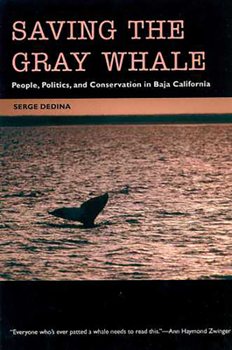Saving the Gray Whale: People, Politics, and Conservation in Baja California
(Part of the Society, Environment, and Place Series)
Select Format
Select Condition 
Book Overview
Once hunted by whalers and now the darling of ecotourists, the gray whale has become part of the culture, history, politics, and geography of Mexico's most isolated region. After the harvesting of gray whales was banned by international law in 1946, their populations rebounded; but while they are no longer hunted for their oil, these creatures are now chased up and down the lagoons of southern Baja California by whalewatchers. This book uses the biology and politics associated with gray whales in Mexican waters to present an unusual case study in conservation and politics. It provides an inside look at how gray whale conservation decisions are made in Mexico City and examines how those policies and programs are carried out in the calving grounds of San Ignacio Lagoon and Magdalena Bay, where catering to ecotourists is now an integral part of the local economy. More than a study of conservation politics, Dedina's book puts a human face on wildlife conservation. The author lived for two years with residents of Baja communities to understand their attitudes about wildlife conservation and Mexican politics, and he accompanied many in daily activities to show the extent to which the local economy depends on whalewatching. "It is ironic," observes Dedina, "that residents of some of the most isolated fishing villages in North America are helping to redefine our relationship with wild animals. Americans and Europeans brought the gray whale population to the brink of extinction. The inhabitants of San Ignacio Lagoon and Magdalena Bay are helping us to celebrate the whales' survival." By showing us how these animals have helped shape the lifeways of the people with whom they share the lagoons, Saving the Gray Whale demonstrates that gray whales represent both a destructive past and a future with hope.
Format:Paperback
Language:English
ISBN:0816518467
ISBN13:9780816518463
Release Date:January 2000
Publisher:University of Arizona Press
Length:186 Pages
Weight:0.70 lbs.
Dimensions:0.5" x 6.0" x 9.0"
Customer Reviews
5 ratings
Highly recommended
Published by Thriftbooks.com User , 24 years ago
(From Planeta Journal) - For the past several years, one of Mexico's most pressing environmental controversies was whether or not the Mexican government and the Mitsubishi Corporation should develop a new salt mining operation within the Vizcaino Biosphere Reserve, one of the world's four breeding areas for gray whales. A candid text, Saving the Gray Whale provides an engaging capsule history of whale conservation in Mexico and a timely review of environmental politics.In fact, the timing could not be more opportune for this book. Within a month of publication, the plans for the salt operation were cancelled. For readers who are only now learning about this issue, this book is an excellent resource.Saving the Gray Whale is a must-read book for whale watchers and readers interested in Mexican environmental issues. The candid tone stems from the author's travels and research in Baja, not to mention dizzying trips to Mexico City, where the labyrinths of political power stray far from efficiency. The author combines analysis from historical reports, planning meetings and from encounters on the road or from a kayak paddled across San Ignacio Lagoon.This book is a treasury of little-known facts ("Gray whales are not gray") and a straightforward review of environmental politics in Mexico -- at least as far as the government is concerned. The list of players is a must-read for anyone interested in environmental issues! Unfortunately, it does not have the same depth when it reviews how the conservation groups ("Non-Governmental Organizations") operate. Is the "Grupo de los 100" really Mexico's "most influential" environmental group? Likewise, what do The Nature Conservancy and World Wildlife Fund do in Mexico? Reports are kept hush and the author doesn't seem to question the lack of transparency.
First-rate
Published by Thriftbooks.com User , 24 years ago
This book combines a captivating portrait of the whales and the people of southern Baja with a well-documented political analysis of the challenges involved in conservation. Plus, it's a great read.
The real scoop behind gray whale conservation in Mexico
Published by Thriftbooks.com User , 24 years ago
This book is a must read for anyone who wants to know about gray whales, conservation, Mexican politics and the people and environment of Baja. The author has obviously done his homework in this incredibly informative and insightful work. And it is a GREAT read!
The Truth About the Gray Whale
Published by Thriftbooks.com User , 25 years ago
The Gray Whales come to mate and calve in Mexico's Baja California lagoons"Saving the Gray Whale", by Serge Dedina, tells their story in understandable language.Dedina's description of the fishing families who struggle to survive amongst them makes the drama all the more compelling.At San Ignacio Lagoon, the fisher families live 25 miles from the nearest electrical outlet. There is no running water. They must truck their drinking water from springs that are 15 miles away over rutted--often impassable--trails. When their old pick-up trucks break down, it is a disaster. They had better know how to repair them, because there are no garages. There are no hospitals. No plumbing. No police. Yet these people are dedicated to living in harmony with the Gray Whale.Dedina tells of the financial forces which endanger this way of life. Major off-shore corporations promise industrial development in the lagoons. They are able to contribute to political candidates who hold out the promise of jobs. Industrial development, would squeeze the Gray Whales out of the lagoons.Dedina has done his homework. He interviewed a former national President of Mexico as well as many leaders on both sides of the controversy.This is the best book on Baja California and the Gray Whale.
Authentic
Published by Thriftbooks.com User , 25 years ago
This book could also be called "How to think about the gray whale". Dedina's account is the first authentic view I've seen of the many complex issues concerning ecotourism.





